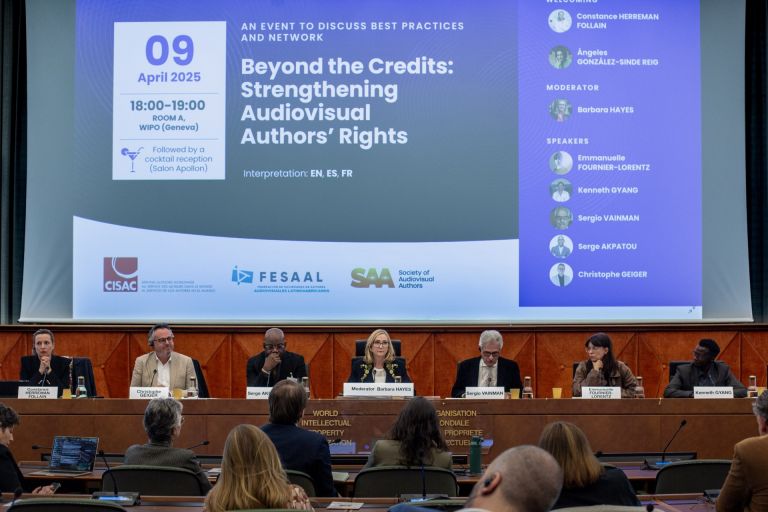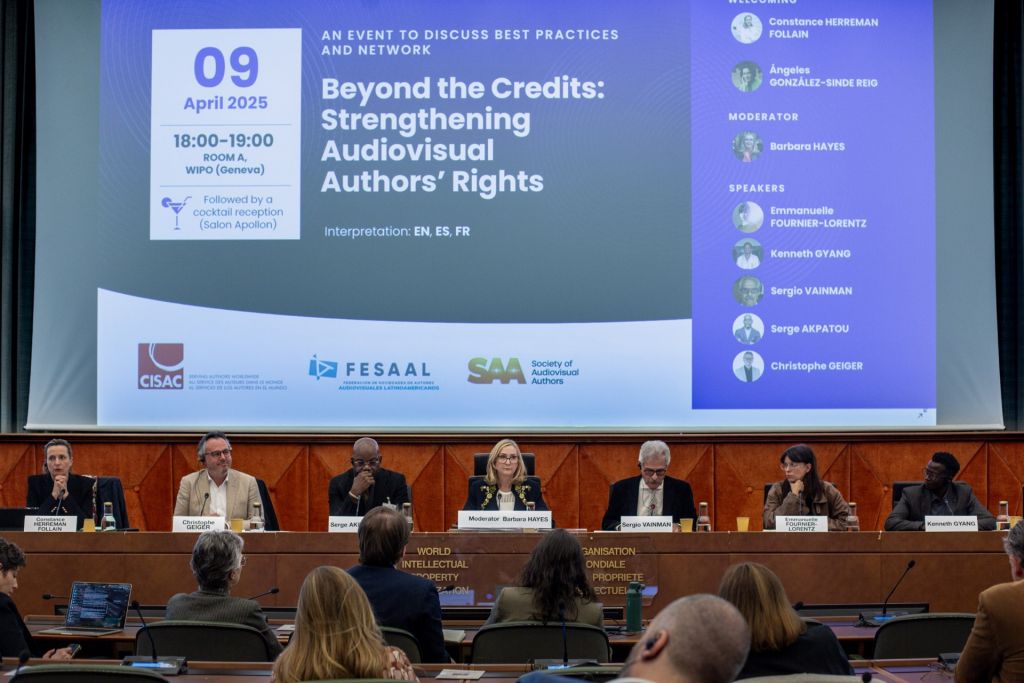Audiovisual authors speak out and urge WIPO Copyright Committee to address their rights

Filmmakers and copyright experts have gathered at the World Intellectual Property Organization (WIPO) in Geneva to discuss the lack of fair remuneration for audiovisual creators, and the urgent need for a study on the global situation of remuneration for audiovisual authors worldwide.
At the SCCR side event, co-organised by CISAC, FESAAL and SAA, prominent screenwriters and directors gave testimonies from three continents and copyright experts highlighted the imbalance between the central creative role played by audiovisual authors and their lack of fair remuneration and protection.
Serge AKPATOU, SCCR delegate from Côte d'Ivoire, introduced the Proposal for a Study on the Rights of Audiovisual Authors and their Remuneration for the Exploitation of their Works and explained its added value:
“In my various roles as an IP lawyer and judge, I have experienced first-hand the precarious situation, economic and legal insecurity of audiovisual authors in West Africa. Côte d’Ivoire has invited WIPO to evaluate the legal system in different countries and to provide a list of possible protections to improve authors' rights. Such a study would raise international awareness of the situation and solutions.” (Serge AKPATOU)
The event brought testimonies from audiovisual authors from different regions of the world explaining the challenges they face.
“Screenwriters and directors are the creative engine behind the films, TV programmes and online series that enrich our lives and shape our culture. Yet their rights, and consequently their remuneration, fall far short of other parties in the production chain. In some regions, creators are not even recognised as authors of their works, leaving them without the basic legal protection they deserve. And in only a few countries – including my native Spain and a few countries in Europe and Latin America– do they enjoy the basic right to be remunerated fairly for the use of their works. This is a global challenge for the community of audiovisual creators. And it requires our collective attention and action. Without question the WIPO SCCR is the best forum for this work.”
Ángeles GONZÁLEZ-SINDE REIG, Spanish screenwriter and director, CISAC Vice-President
“I was very surprised to discover that being a director and screenwriter is one of the most precarious professions in Switzerland. My experience is not unique. Being young, a woman and inexperienced is not an ideal combination when dealing with production companies. The first time I was offered a job I accepted it excitedly before signing the contract. I was offered minimum payment, I had to negotiate for 4 months and work for 9 months, and in the end, I barely received an increase. I've learned since then, but I still have to negotiate every time and fight like I'm defending my child.”
Emmanuelle FOURNIER-LORENTZ, Swiss author and screenwriter, SAA Patron
“In most African countries, national laws do not grant any remuneration rights to audiovisual authors. Too often, we are left with no choice but to sign contracts with buy-out clauses that impose fixed fees in exchange for our rights, long before the true value of a film’s success can be determined. Bringing a new work to the screen is a long and uncertain process, often taking years. Without the ability to earn a fair livelihood, many of my fellow Nigerian creators have been forced to leave the industry.”
Kenneth GYANG, Nigerian screenwriter and director, Creators@CISAC
“Some may wonder why professionals agree to sign under such unfavourable conditions. I can also explain this with a single sentence, as forceful as Ulpiano's: hunger is a small door, and you have to bend down to get through. Heartbreaking, but unfortunately true. I have had before my eyes contracts whose clauses read: ‘the author grants the right for the work to be reproduced, in whole or in part, modified or adapted, in a free version and under another title, its characters used for independent commercialisation; in all media invented and to be invented, created and to be created; in all territories of the planet discovered and to be discovered; without any limit of time or number of uses’. I give my word that I have added nothing of my own making or of my scriptwriter's imagination. This comes from my 50 years of experience in the sector, and I can assure you that I've never seen a series without a script or a film without a director”.
Sergio VAINMAN, Argentinian screenwriter, ARGENTORES Vice president
Professor Christophe GEIGER responded to the question of how to meet the challenges faced by audiovisual authors.
“The traditional tool to remedy the asymmetry of bargaining power is copyright contract law. The problem is that none of the authors would like to litigate against their producers, and if they do, they get blacklisted, and this also involves legal costs. So, it's certainly not a way to fix that. Some of my colleagues call copyright contract law ‘a toothless tiger’. There are many advantages to having statutory remuneration rights instead, especially when they are coupled with mandatory collective management, not least the legal security for authors. We have very good experience in the countries where this has been implemented in different fields of exploitation, such as Italy, Spain, Germany and Poland. A study would be very helpful here to make a comparative analysis.”
Christophe GEIGER, Professor of Law, Luiss Guido Carli University, Rome

